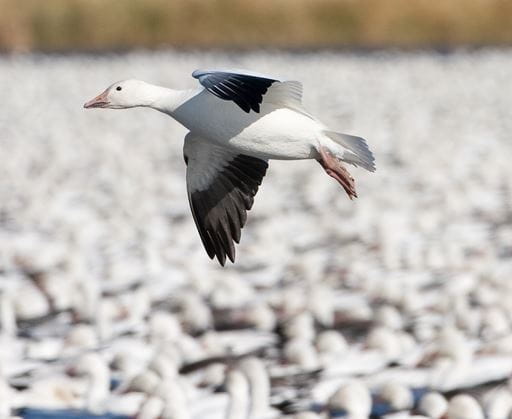Released on April 8, 2022
The Ministry of Agriculture is reminding poultry producers with flocks of all sizes to follow all necessary biosecurity protocols to keep their flocks free of diseases after a highly pathogenic avian influenza (HPAI) H5 strain was detected in a wild bird in Saskatchewan.
Samples collected from a snow goose found near Elrose have been confirmed positive for HPAI by the Canadian Food Inspection Agency. This confirmation follows the detection of HPAI in poultry and wild birds in the United States and in several Canadian provinces.
The last time HPAI was found in Saskatchewan in either commercial poultry or wild birds was in 2007.
Protecting commercial flocks includes preventative measures such as keeping wild birds away from poultry flocks and their food and water supply, limiting visitors, and monitoring bird health. Producers should contact their veterinarian immediately if they have concerns about the health status of their flocks. If HPAI is suspected, producers should also contact their local Canadian Food Inspection Agency office.

Small flocks are considered high-risk for HPAI infection as they are most often raised in an extensive fashion e.g. allowed access to outdoor pens or free-range. This means there is a high probability of contact with wild birds or environments visited by wild birds that may be contaminated with HPAI virus. Small flock owners are encouraged to confine their birds indoors if at all possible during this high risk period of wild bird migration, and follow the same measures indicated for commercial flocks.
Typically, strains of avian flu do not cause obvious signs of disease in wild birds. However, this H5 strain has resulted in deaths in some species of wild birds, including snow geese and Canada geese, as well as some raptors.
As migratory birds make their way back to Saskatchewan, please report any sick or dead birds to the Ministry of Environment to assist with monitoring efforts. If you find any of the following, please contact the Inquiry Centre at 1-800-567-4224 or centre.inquiry@gov.sk.ca:
- Clusters of two or more dead waterfowl (e.g. ducks, geese) or other water birds.
- Dead raptors or avian scavengers (e.g. ravens, crows, gulls).
- Raptors, waterfowl or avian scavengers that appear to be sick.
- Large groups of dead birds (e.g. more than 50) of any species.
Reports can also be made to the Canadian Wildlife Health Cooperative at 306-966-5815 or cwhc.wildlifesubmissions.org/#/.
Although the risk of transmission to humans is considered low, people should not touch dead birds or other wildlife with their bare hands. Protective eyewear and masks are recommended as an additional precaution. Hands should be thoroughly washed before and after with soap and water or alcohol-based hand sanitizer. Birds should be placed in a plastic bag prior to submission.
This strain of HPAI does not pose a food safety risk. Regular food safety and hygiene precautions should be followed when preparing wild game. Hunters should avoid eating birds that are visibly ill.
Anyone with further questions on avian influenza in poultry can contact the Ministry of Agriculture's Veterinary Unit at 1-306-787-2150.
-30-
For more information, contact:
Angela Hall
Agriculture
Regina
Phone: 306-787-2359
Email: angela.hall@gov.sk.ca
Chris Hodges
Environment
Regina
Phone: 306-787-0143
Email: chris.hodges2@gov.sk.ca

